2018 Year in Review
For all of us at Helen Keller International, the beginning of a new year is always a time of reflection and great optimism.
We welcome 2019 and all the opportunities it brings to strengthen our impact and accelerate our progress toward improving the health of the world’s most vulnerable people. We are also proud to celebrate what we achieved in 2018, thanks to the support of our generous donors, partners, and friends—and with the commitment of communities in the U.S. and the 20 other countries where we work.
Your support allowed us to save sight, prevent malnutrition among mothers and children, and improve the health of people in underserved places where the needs are great, but access to basic health care is scarce.
Here is a look back at 2018, highlighting our most inspiring moments from our programs around the world. Each of these brief profiles is living proof that, in the words of our co-founder, Helen Keller, “Alone we can do so little; together, we can do so much.”
January: Nepal
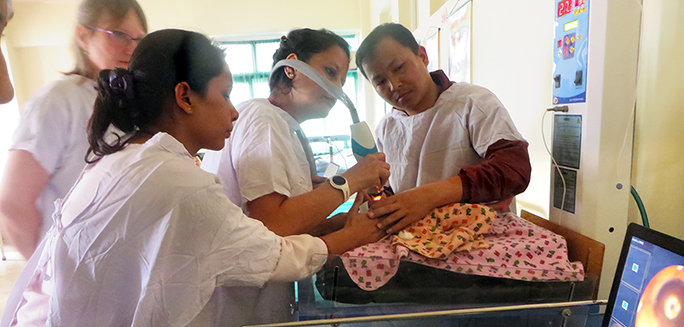
When babies are born prematurely, they are at risk of a potentially blinding disease called retinopathy of prematurity (ROP) caused by abnormal growth of the blood vessels in the retina. The risk of blindness and vision loss is greater when premature babies get too high a concentration of oxygen in incubators.
In Nepal’s capital city of Kathmandu, Helen Keller International trained health workers in neonatal intensive care units to effectively prevent and treat this disease. We also provided hospitals with medical equipment and strengthened health systems in Nepal to better equip them to reduce the risk of ROP and preserve the sight of premature babies.
February: United States
All four children in the Lopez family need prescription glasses to correct their vision, but in 2018, their parents couldn’t afford the vision care they needed.
Neither Jasmine, Agustin, Andrew nor Christopher could see well enough to do their homework properly or focus on the blackboard in class, and their learning was suffering. During a visit to their school in February 2018, our vision care program gave each of them a free eye exam and updated prescriptions for glasses. They picked out stylish new frames and received their new glasses two weeks later.
Their mother, Florencia Franco, told us, “School is easier now for all of them. They can do most of their homework on their own. All of them love their glasses. They are happy.”
March: Vietnam
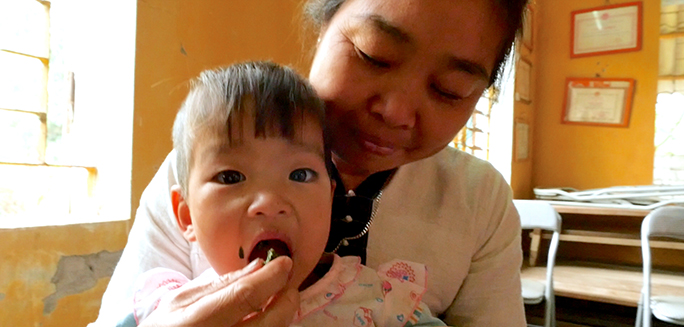
In Vietnam, an estimated one in every four children under the age of five suffers from stunted physical growth and impaired brain development caused by chronic malnutrition. Stunting is irreversible.
In 2018, we helped the poorest families in Vietnam prevent malnutrition by growing healthy food on small homestead farms. We also trained community nutrition volunteers to educate families and caregivers about what to feed infants and young children to ensure they get the nutrients they need for healthy development.
In March 2018, grandmother Ha Thi Vong was among a group of caregivers in Son La Province who benefitted from a community cooking and nutrition demonstration led by our volunteers. As she watched her young granddaughter happily eating a nutritious snack prepared by the volunteers, Ha Thi said, “I want my grandchildren to be as healthy as other children.”
April: Ivory Coast
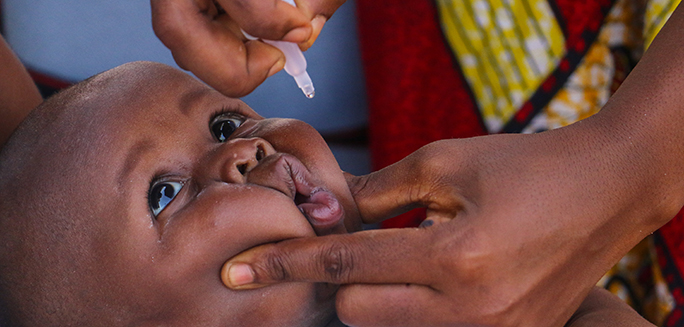
Vitamin A deficiency is a leading cause of preventable blindness in children worldwide and contributes to a high risk of disease and death. A twice-yearly Vitamin A supplement given to children between the ages of six months to five years is one of the most effective, affordable ways to reduce preventable child blindness, disease, and death.
In April 2018, HKI worked in partnership with the Ministry of Health in Ivory Coast to provide children with Vitamin A supplements twice a year as part of the country’s regular health campaigns. We helped government health workers go far and wide to reach as many communities as possible and administer the Vitamin A drops to all eligible children, including this “cheeky” little baby.
May: Niger
Since 2015, Niger has been suffering from a major humanitarian crisis in the southeast caused by conflict between government forces and the insurgency group Boko Haram.
The conflict hit the region of Diffa particularly hard, forcing an estimated 300,000 people to seek refuge in temporary camps or in local host communities. Overcrowded, unsanitary living conditions have increased the risk of outbreaks of deadly waterborne diseases such as cholera.
In 2018, Helen Keller International launched emergency programs to improve sanitation and hygiene and prevent cholera outbreaks. We mobilized communities to lead these efforts and build local handwashing stations and latrines. We also distributed hygiene kits to vulnerable families. We have been working in Diffa since 2005, before the crisis, and we’re committed to strengthening health systems in communities for the long term.
June: Niger
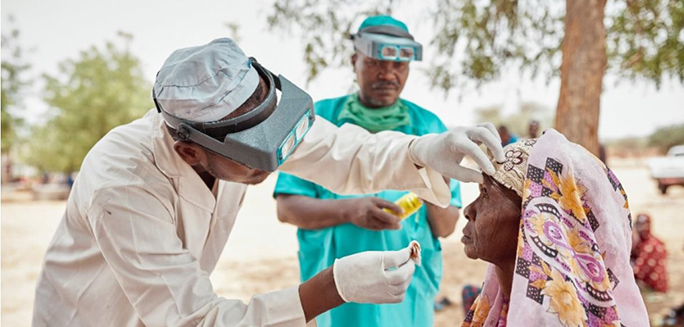
In four regions across Niger, our teams are working in partnership with the government to eliminate trachoma, a contagious eye infection that is the world’s leading cause of blindness. Trachoma is easily preventable and treatable.
Within the past 18 months, HKI and its partners performed more than 13,000 surgeries in Niger to prevent blindness and eye damage caused by repeated trachoma infections.
In June of 2018, a surgeon supported by HKI, Habou Bacar Mamane Nassirou, removed the post-surgery bandages from Fajimata Rahama. Much to her joy, the procedure improved her vision and relieved her nearly constant pain. Fajimata is living proof that simple solutions can transform lives.
July: Mozambique
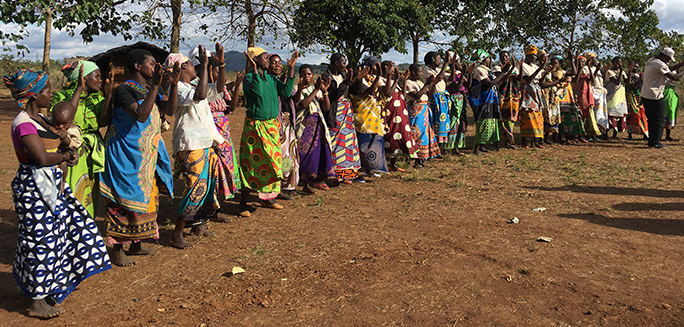
In Mozambique’s Tete Province, we are working with partners to prevent malnutrition among children under the age of five—and to improve the status of women in the poorest rural communities—through agriculture.
In the past year, our programs empowered women in villages in Tete to earn income and improve nutrition for their children through small-scale farming and raising livestock. We also educated mothers and pregnant women about the healthiest ways to store and cook food and helped them set up community savings groups as safety nets for emergencies.
August: United States
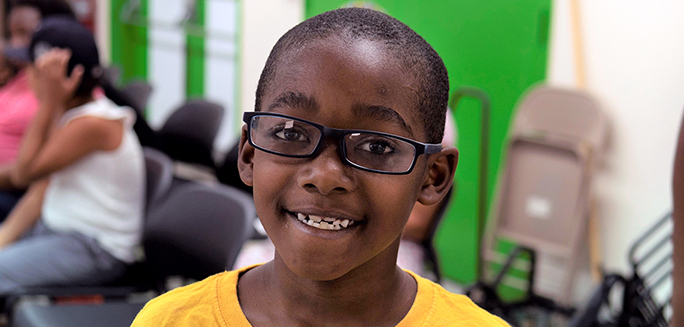
For almost 25 years, we have been providing free eye exams and glasses to low-income schoolchildren in urban areas of the United States. In 2018, we expanded our program to serve homeless youth and families, underserved veterans, newly arrived immigrants and refugees, and low-income seniors.
Eight-year-old Ezekiel and his mother, Babee, live in a homeless shelter in New York City. They are among the families who benefitted from the expansion of our program.
Ezekiel was very excited to get his vision screening, eye exam, and new glasses just in time for the start of the new school year: “I’m looking forward to reading, doing my homework, and focusing. The glasses make me look cooler. And maybe I look smart.”
September: Cameroon
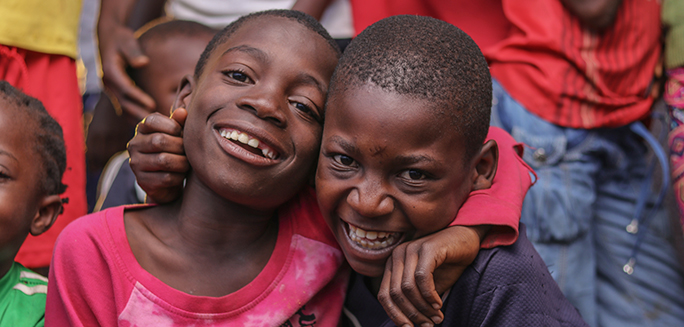
Onchocerciasis, or river blindness, is a tropical disease transmitted by blackflies that live and breed near rivers and streams. It is the second leading cause of infectious blindness worldwide.
Our programs prevent and treat river blindness in Cameroon. In fact, our goal is to work with global and local partners to eliminate this neglected disease in Cameroon and other countries where it is a public health problem.
In 2018, we supported the government of Cameroon to deliver mass distributions of a drug called invectin to prevent and treat river blindness among at-risk populations. In September, we completed a mass drug distribution campaign in Cameroon’s Bafang District, benefitting the vulnerable children in this photograph as well as adults.
October: Tanzania
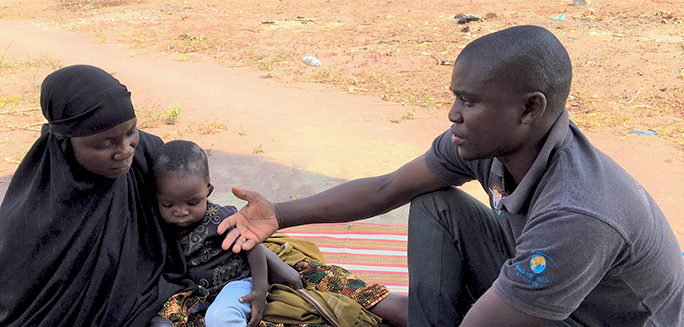
More than a third of children under the age of five in Tanzania suffer from stunting caused by malnutrition, and nearly half of all women of childbearing age suffer from anemia due to iron deficiency.
In 2018, our program trained teams of community health workers to bring health services right to people’s doorsteps on home visits to improve nutrition among vulnerable mothers and young children in the Mtwara region. On their home visits, the health workers screen children for signs of malnutrition and illness, educate families about healthy feeding practices for infants and kids, and share information about improving sanitation and hygiene.
Bringing basic health care directly to households ensures that we reach as many mothers and children in need as possible.
November: Cambodia
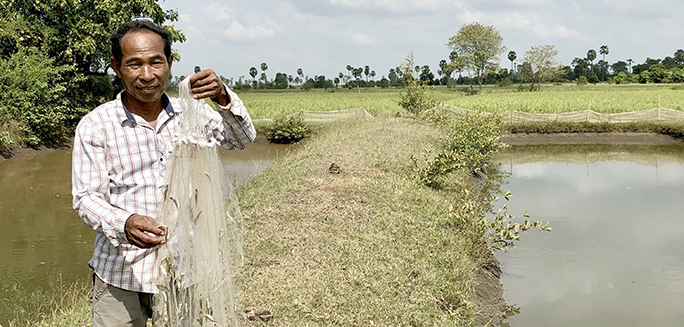
More than 65 percent of Cambodia’s population depends on subsistence farming, fisheries, and forestry for survival. Frequent weather shocks due to climate change make rural communities very vulnerable to malnutrition and extreme poverty.
In 2018, we empowered rural communities in Cambodia to improve nutrition and increase their income through polyculture fish farming. We train local fish farmers to raise several species of fish together in their ponds, which increases their profits and helps support the ecosystem. Our program also ensures that families have access to plentiful supplies of fish as a source of affordable, highly nutritious food.
Kang Bunthoeun is a 50-year-old father and fish farmer who participated in our program Since receiving our training, he told us, “My profits have grown significantly,” and his business is booming.
December: Bangladesh
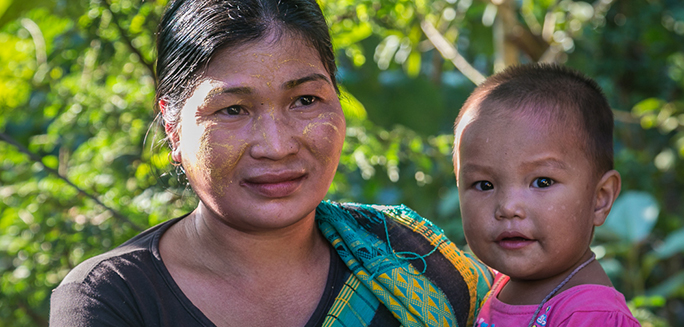
In rural Bangladesh, one of the most flood-prone countries in the world, our innovative, holistic program helped extremely poor families in the Chittagong Hills Tract Region to increase their income and access to nutritious food—and reduce the impact of climate shocks.
In 2018, we prioritized training groups of women farmers to increase harvests, improve profits marketing, generate more revenue for their families, and set up savings groups. This empowered women not only with a source of income, but also with greater influence in their homes and communities.









